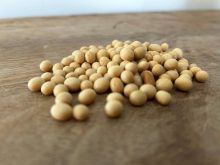Chicago | Reuters—Chicago corn, soy and wheat eased on Wednesday as traders took profits and monitored the possible impacts of U.S. tariffs on imports from Mexico and Canada, set to take effect on March 4 after a 30-day delay.
Market players are dealing with uncertainty over the proposed U.S. tariffs after U.S. President Donald Trump on Wednesday raised hopes for another month-long pause on steep new tariffs on imports from Mexico and Canada, saying they could take effect on April 2.
A White House official, however, said Trump’s previous March 4 deadline for the 25 per cent tariffs on Mexican and Canadian goods remained in effect “as of this moment,” pending his review of Mexican and Canadian actions to secure their borders and halt the flow of migrants and the opioid fentanyl into the U.S.
Read Also

U.S. livestock: Cattle, hogs end week on high note
Cattle contracts and nearby hog futures ended the week on a high note after a week rife with losses. Most-traded…
The most active soybean contract Sv1 on the Chicago Board of Trade ended down 7-1/2 cents at $10.41-1/4 a bushel.
CBOT’s most active corn contract Cv1 settled down 3/4 cent to $4.93-1/2 a bushel, and most active wheat fell 8 cents to finish at $5.79-3/4 per bushel.
Month-end positioning drove all three commodities downward, said Karl Setzer, a partner at Consus Ag Consulting, with Friday being the first notice day for deliveries against CBOT March futures contracts.
Soybeans in particular are feeling pressure from the South American harvest, which is widely forecast to reach a record volume, he said.
Attention is also turning to the U.S. Department of Agriculture’s annual Outlook Forum on Thursday, where early projections for corn and soybean planting will be given. Analysts expect a shift in acreage from soybeans towards corn.
Signs that U.S. farmers will expand corn planting drove selling this week by commodity funds that have a large net long position, analysts said, and wheat also fell despite bitter cold temperatures in the U.S. Plains last week, with crops protected by snow cover.
“It looks like the wheat made it through with very little damage,” said Setzer.
Warming temperatures in the same region this week are expected to further benefit the crop, he said.
—Additional reporting by Gus Trompiz in Paris and Peter Hobson in Canberra
















